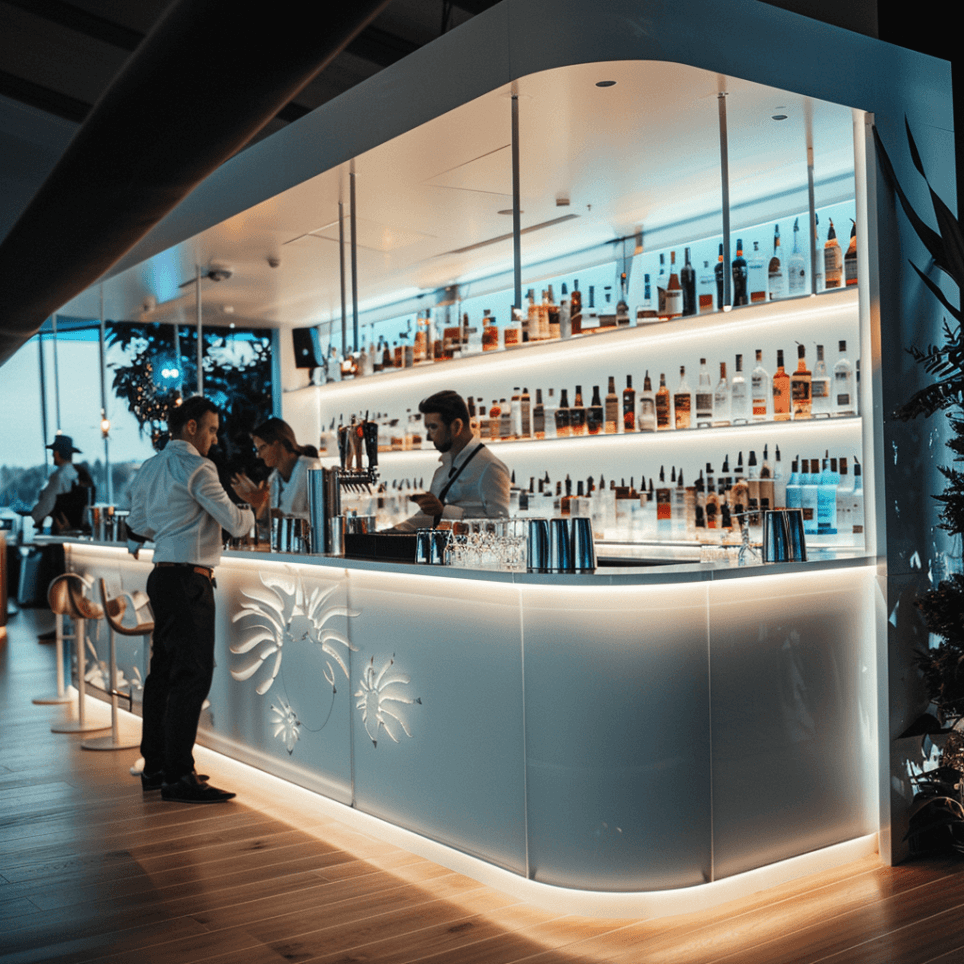
Are you passionate about mixology and looking to kickstart your bartending career in Wisconsin? Understanding the importance of obtaining a bartending license is crucial in this industry. From legal requirements to maintaining your license, this comprehensive guide will walk you through everything you need to know about acquiring and keeping your Wisconsin bartending license.
We will delve into the essential aspects of bartending licensing in Wisconsin, including eligibility criteria, educational requirements, the application process, and staying compliant with state laws and regulations. Whether you're a seasoned bartender or someone planning to start an exciting career in bartending, this guide will be your go-to resource for navigating the ins and outs of bartending licensing in the Badger State. Let's raise a glass to your journey towards becoming a licensed bartender in Wisconsin!
The Importance of a Bartending License in Wisconsin
Bartending is not just about mixing drinks and serving customers; it is a profession that requires skill, knowledge, and responsibility to ensure the quality of drinks and safety of customers, among others. In Wisconsin, obtaining a bartending license is not only a legal requirement but also an essential step towards ensuring the safety and well-being of both patrons and the community. This section will explore the importance of a bartending license, highlighting the benefits it provides to both bartenders and establishments.
Ensuring Compliance with State Laws and Regulations
Obtaining a bartending license in Wisconsin is necessary to comply with the state's laws and regulations regarding the service of alcohol. The Wisconsin Department of Revenue and the Wisconsin Alcohol and Tobacco Enforcement Unit oversee the licensing process and enforce the responsible service of alcohol.
By acquiring a bartending license, you demonstrate your commitment to adhering to these state laws and regulations. This includes understanding age restrictions, hours of operation, serving limits, and other guidelines that are in place to promote responsible alcohol consumption and prevent underage drinking.
Enhancing Professionalism and Credibility
A bartending license adds a layer of professionalism and credibility to your bartending career. It showcases that you have undergone the necessary training and education to ensure the safe and responsible service of alcohol.
Having a license can make you stand out in a competitive job market by demonstrating to potential employers that you possess the knowledge and skills required to excel in your role. It also provides reassurance to customers that they are being served by a competent and responsible bartender.
Liability Protection for Bartenders and Establishments
One of the significant advantages of holding a bartending license is the liability protection it offers. In the event of an alcohol-related incident or accident, having a license can provide legal protection for both bartenders and the establishments they work for.
By obtaining a license, you show that you have been trained in responsible alcohol service and understand the potential risks associated with serving alcohol. This can help mitigate liability concerns and protect you from legal repercussions in case of any unfortunate incidents.
Expanded Job Opportunities
In Wisconsin, many establishments require bartenders to hold a valid bartending license. By obtaining this license, you open yourself up to a wider range of job opportunities in bars, restaurants, hotels, and other establishments that serve alcohol.
Having a license not only makes you a more attractive candidate for potential employers but also allows you to work in different settings, such as event venues, nightclubs, and catering services. It provides you with the flexibility to explore various bartending roles and advance your career in the industry.
Personal and Professional Development
The process of obtaining a bartending license involves educational courses and training, which can contribute to your personal and professional development. These courses cover topics such as responsible alcohol service, mixology techniques, customer service, and legal obligations.
By completing these courses and acquiring a license, you gain valuable knowledge and skills that can enhance your bartending abilities. Additionally, ongoing education and training requirements for license renewal enable you to stay updated with industry trends, new techniques, and regulations, helping you grow as a bartender.
Obtaining a bartending license in Wisconsin is crucial for both legal compliance and professional advancement. It ensures that you meet the state's requirements for serving alcohol responsibly and ethically. Furthermore, it enhances your credibility, expands your job opportunities, provides liability protection, and contributes to your personal and professional growth as a bartender. Now that you understand the importance of a bartending license, let's explore the requirements and process for obtaining one in Wisconsin.
Requirements for Obtaining a Bartending License in Wisconsin
To obtain a bartending license in Wisconsin, aspiring bartenders must fulfill certain requirements set by the state. This section will delve into the various criteria that must be met to be eligible for a bartending license in Wisconsin. From age restrictions to educational prerequisites, understanding these requirements is crucial for anyone seeking to embark on a bartending career in the Badger State.
1. Age and Eligibility
The first requirement for obtaining a bartending license in Wisconsin is meeting the minimum age requirement. To serve alcohol in Wisconsin, you must be at least 18 years old. However, it's important to note that some establishments may have their own policies requiring the age of their bartenders.
Additionally, you must be legally eligible to work in the United States and provide the necessary documentation to prove your eligibility. This typically includes a valid Social Security Number or appropriate work visa.
2. Education and Training Requirements
To ensure the responsible service of alcohol, Wisconsin requires aspiring bartenders to complete an approved bartending course. This course provides the necessary education and training on topics such as alcohol laws, safety procedures, identification of fake IDs, and techniques for serving alcohol responsibly.
The length and content of the bartending course may vary depending on the provider. It is important to choose a course that is approved by the state and covers the required curriculum.
3. Legal and Background Checks
Before obtaining a bartending license in Wisconsin, you must undergo a legal and background check. This includes a criminal background check to ensure you have no disqualifying convictions that would prevent you from serving alcohol.
Certain offenses, such as violent crimes or drug-related offenses, may disqualify you from obtaining a bartending license. It is essential to review the specific criteria and disqualifications outlined by the Wisconsin Department of Revenue and the Alcohol and Tobacco Enforcement Unit.
4. Application Process
Once you have met the age, eligibility, education, and background check requirements, you can proceed with the application process for a bartending license in Wisconsin. The application typically involves submitting the necessary documentation, completing an application form, and paying the required fees.
The specific documentation required may include proof of completion of an approved bartending course, identification documents, and any other supporting materials outlined by the licensing authorities. It is crucial to review the application requirements thoroughly and ensure that all documents are accurate and up to date.
5. Additional Requirements for Specific Licenses
In some cases, additional requirements may apply depending on the type of bartending license you are seeking. For example, if you intend to work in a venue that allows dancing or live entertainment, you may need to obtain an additional license or permit.
It is important to research and understand any additional requirements specific to the type of establishment or service you wish to work in. This may include obtaining a separate license for serving alcohol at events or obtaining a manager's license if you aspire to take on a leadership role in the industry.
By meeting these requirements, aspiring bartenders in Wisconsin can take the necessary steps to obtain their bartending license. Remember to thoroughly research and understand the specific requirements set by the state and local licensing authorities to ensure a smooth application process. Once you have met these requirements, you will be well on your way to embarking on an exciting bartending career in Wisconsin.
The Process of Acquiring a Wisconsin Bartending License
Once you have met the requirements for obtaining a bartending license in Wisconsin, you can proceed with the process of acquiring it. This section will guide you through the step-by-step process, from enrolling in a bartending course to submitting your application. Understanding each stage of the process will help you navigate it effectively and ensure a smooth and successful application for your Wisconsin bartending license.
Step #1: Enrolling in a Bartending Course
The first step in acquiring a Wisconsin bartending license is to enroll in an approved bartending course. Research and select a reputable bartending school or training provider that offers a comprehensive curriculum covering the required topics for the license.
When choosing a bartending course, consider factors such as the length of the program, the cost, the availability of both in-person and online options, and the reputation of the school or provider. It is important to ensure that the course is approved by the Wisconsin Department of Revenue and the Alcohol and Tobacco Enforcement Unit.
Taking Online vs. In-Person Courses
When it comes to bartending courses, there’s the option to choose between online courses or in-person courses. Here are some points to consider when choosing which might be best for you:
Online Courses: Online bartending courses offer more flexibility for individuals who need to manage responsibilities. Having the flexibility to learn at your own pace and from anywhere is possible with online bartending courses. In-person training, however, may offer relatively more networking opportunities.
In-Person Courses: In-person bartending schools can be hands-on, with feedback that is readily available, and allows the opportunity to practice in a bar setting. In-person courses might have a more rigid schedule though and can be more expensive than online courses.
The choice between going online or in-person may ultimately depend on your preferences, schedule, learning style, and budget.
Step #2: Completing the Course and Passing the Examination
Once enrolled in the bartending course, you will need to actively participate and complete all the required coursework and training. This includes attending classes, participating in practical exercises, and studying the course materials.
At the end of the course, you will typically need to pass an examination to demonstrate your understanding of the material covered. The examination may consist of written tests, practical demonstrations, or a combination of both. Ensure that you are well-prepared by studying the course materials, practicing mixology techniques, and familiarizing yourself with the legal and safety aspects of bartending.
Step #3: Applying for the License
After successfully completing the bartending course and passing the examination, you can proceed with the application process for your Wisconsin bartending license. Begin by gathering all the necessary documentation, including your course completion certificate, identification documents, and any other supporting materials required by the licensing authorities.
Complete the application form accurately and ensure that all required fields are filled out correctly. Double-check the information provided to avoid any delays or complications in the application process. Be prepared to pay the required fees, which may vary depending on the type of license you are applying for.
Step #4: Submitting the Application
Once you have completed the application form and gathered all the required documentation, submit your application to the appropriate licensing authorities. This is typically the Wisconsin Department of Revenue or the Alcohol and Tobacco Enforcement Unit, depending on the specific requirements for your license.
Submit your application through the designated channels, which may include online submission, mail, or in-person submission at the licensing office. Follow the instructions provided by the licensing authorities to ensure that your application is received and processed efficiently.
Step #5: Waiting for Approval
After submitting your application, you will need to wait for it to be reviewed and processed by the licensing authorities. The duration of the approval process may vary, so it is important to be patient during this period.
While waiting for approval, it is recommended to track the progress of your application and follow up with the licensing authorities if necessary. Keep a record of any correspondence or reference numbers provided to facilitate communication and ensure a smooth process.
Once your application is approved, you will receive your Wisconsin bartending license. Congratulations! With your license in hand, you are now ready to embark on your bartending career in Wisconsin. Once you have obtained your bartending license in Wisconsin, it is important to understand the requirements for maintaining and renewing it.
Maintaining and Renewing Your Bartending License
This section will guide you through the steps necessary to keep your license active and compliant with state regulations. By staying up to date with the renewal process and fulfilling any obligations, you can continue to enjoy the benefits of being a licensed bartender in Wisconsin.
Periodic License Renewal
In Wisconsin, bartending licenses are typically valid for a specific period, usually two years. It is crucial to keep track of the expiration date of your license to ensure timely renewal. Failure to renew your license before it expires may result in the suspension or revocation of your bartending privileges.
To renew your license, you will need to follow the renewal process outlined by the Wisconsin Department of Revenue or the Alcohol and Tobacco Enforcement Unit. This may involve submitting a renewal application, paying the required fees, and providing any necessary documentation.
Continuing Education and Training
Renewing your bartending license in Wisconsin often requires completing continuing education and training. This serves to ensure that licensed bartenders stay updated with the latest industry trends, regulations, and best practices.
The specific requirements for continuing education and training may vary depending on the licensing authority and the type of license you hold. This may include attending workshops, seminars, or online courses that focus on topics such as responsible alcohol service, mixology techniques, or legal obligations.
It is important to keep records of your completed continuing education and training activities, as you may be required to provide proof of completion during the renewal process.
Dealing with Legal Issues
As a licensed bartender, it is essential to conduct yourself responsibly and in compliance with the law. Any legal issues, such as criminal charges or violations related to alcohol service, can have serious consequences for your bartending license.
If you find yourself facing legal issues, it is important to seek legal counsel and address the situation promptly. Failure to do so may result in disciplinary action, including the suspension or revocation of your license.
Maintaining a clean legal record, adhering to the state's alcohol service regulations, and practicing responsible bartending will help ensure the longevity of your license and protect your professional reputation.
By staying on top of the renewal process, fulfilling continuing education requirements, and conducting yourself responsibly, you can maintain and renew your bartending license in Wisconsin. Remember to familiarize yourself with the specific renewal requirements outlined by the licensing authorities and submit all necessary documentation and fees in a timely manner. By doing so, you can continue to enjoy the privileges and opportunities that come with being a licensed bartender in Wisconsin.
Wisconsin Bartending Laws and Regulations
To be a responsible and compliant bartender in Wisconsin, it is crucial to have a solid understanding of the state's bartending laws and regulations. This section will provide an overview of key legal considerations that bartenders must be aware of when serving alcohol in Wisconsin. By familiarizing yourself with these laws, you can ensure the safety of patrons, maintain legal compliance, and protect your bartending license.
Serving Alcohol Responsibly
Wisconsin law places a strong emphasis on responsible alcohol service. As a bartender, it is your responsibility to serve alcohol in a manner that promotes safe consumption and prevents overconsumption. Some key considerations regarding responsible alcohol service include:
- Age Verification: Ensure that you always verify the age of patrons before serving them alcohol. Acceptable forms of identification include driver's licenses, state IDs, passports, or military IDs.
- Serving Limits: Familiarize yourself with Wisconsin's laws regarding serving limits. It is illegal to serve alcohol to someone who is already intoxicated or to serve more than the legal limit of alcohol in a single drink.
- Intoxicated Patrons: Refuse service to patrons who appear intoxicated. It is your legal obligation to prioritize their safety and the safety of others by not serving them alcohol.
- Designated Drivers and Alternative Transportation: Encourage patrons to use designated drivers or alternative transportation options if they are unable to drive safely.
Legal Consequences for Violations
Failure to comply with Wisconsin's bartending laws and regulations can result in serious legal consequences. Violations may lead to fines, suspension or revocation of your bartending license, and potential criminal charges. Some common violations that bartenders should avoid include:
- Serving Minors: Selling or serving alcohol to individuals under the legal drinking age can lead to severe penalties, including fines and potential criminal charges.
- Over-service: Continuing to serve alcohol to someone who is visibly intoxicated can result in legal consequences and potential liability if that person causes harm to themselves or others.
- Fake IDs: Accepting or failing to detect fake IDs can lead to legal issues. It is essential to thoroughly verify the authenticity of identification documents to prevent serving alcohol to underage individuals.
- Violating Hours of Operation: Familiarize yourself with the specific hours of operation for your establishment and adhere to them strictly. Violating these hours can result in penalties and potential legal consequences.
Understanding Local and State Laws
In addition to statewide laws, bartenders in Wisconsin must also be aware of local ordinances and regulations that may apply. These may include specific rules related to noise control, outdoor seating, smoking areas, and other local considerations. It is important to familiarize yourself with the local laws and regulations that pertain to the establishment where you are employed.
To ensure compliance with both state and local laws, regularly review and stay updated on any changes or updates to the regulations. This may involve consulting resources provided by the Wisconsin Department of Revenue, the Alcohol and Tobacco Enforcement Unit, and local licensing authorities.
By understanding and adhering to Wisconsin's bartending laws and regulations, you can protect yourself, your patrons, and your establishment. As with other states, familiarize yourself with responsible alcohol service practices, avoid violations, and stay informed about any changes to the state laws. By doing so, you can ensure a safe and compliant environment as a licensed bartender in Wisconsin.







